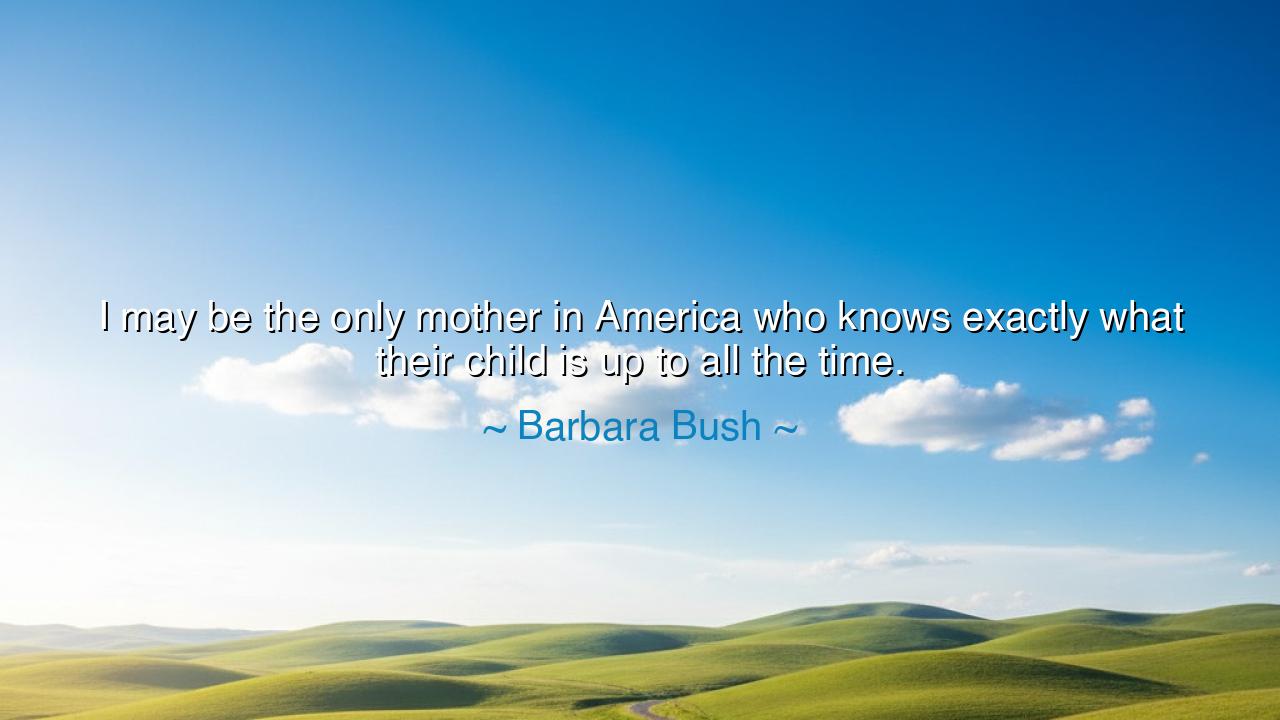
I may be the only mother in America who knows exactly what their
I may be the only mother in America who knows exactly what their child is up to all the time.






The words of Barbara Bush — “I may be the only mother in America who knows exactly what their child is up to all the time.” — carry a blend of humor, pride, and timeless maternal insight. Beneath the surface wit lies a profound reflection on the nature of motherly vigilance, responsibility, and presence. To know one’s child intimately is to bear witness not only to their actions, but to the unfolding of their character, choices, and development. In this simple statement, Bush encapsulates the eternal role of a mother as both guide and observer, protector and mentor, whose attention shapes the path of her children long before they step into the wider world.
To claim such knowledge — to “know exactly what their child is up to all the time” — emphasizes the incredible attentiveness required of motherhood. In the ancient world, mothers were revered not only for their ability to bear children but for their wisdom in guiding them through danger, temptation, and the trials of society. A child’s misstep could ripple outward, affecting families, communities, and even nations. Barbara Bush’s words echo this ancient understanding: the mother who watches, who knows, who understands, wields both influence and moral authority over the next generation.
There is also an element of humor and humility in Bush’s declaration. She does not claim omnipotence or perfection, but rather the rare intimacy of connection that comes from experience, observation, and enduring care. The ancients would recognize this duality: Socrates himself extolled the value of knowledge tempered by awareness of one’s limits. To know a child fully is both a privilege and a burden, demanding vigilance, patience, and discernment. Bush’s statement captures the essence of this delicate balance, acknowledging that motherhood is as much about understanding the unseen as managing the visible.
The quote also underscores the moral and ethical responsibility inherent in parenting. To know what one’s child is doing is not merely about control, but about guidance — ensuring that the young navigate the world with integrity, prudence, and courage. Mothers, throughout history, have played this pivotal role. Consider Queen Elizabeth I, whose governesses and tutors monitored her education, character, and interactions, preparing her for the enormous responsibilities of leadership. The principle remains timeless: attentive guidance during formative years equips children to face the wider world with discernment and strength.
Bush’s reflection also illuminates the influence of presence in shaping behavior and character. Children are often guided not by fear or restriction, but by the consistent awareness and support of those who care for them most. The mother who knows what is happening, who listens, who observes, and who intervenes with wisdom, becomes a moral compass, teaching children the difference between right and wrong, caution and recklessness. Her vigilance is not oppression, but a form of protective love that ensures children can thrive safely while learning responsibility.
History is rich with mothers whose attentiveness shaped destiny. Consider Harriet Tubman, who, though not raising her own children in traditional ways, maintained a vigilance over those she led to freedom that ensured their safety and survival. Her awareness, insight, and protective foresight exemplify the principle that knowing and guiding the young is a sacred and powerful act. Barbara Bush’s statement, though delivered in a modern context, reflects this same enduring truth: knowledge, attention, and presence are tools of love that shape the future.
From this reflection emerges a clear lesson: presence, attentiveness, and engagement are vital in guiding the young. To parent is not merely to provide sustenance, but to understand the unfolding inner life of a child — their fears, desires, and impulses — and to guide them with wisdom, love, and clarity. By being present in mind and spirit, a mother ensures that her children develop the discernment and character necessary to navigate the world responsibly.
Thus, Barbara Bush’s words endure as both testament and teaching: to truly know one’s child is a rare and sacred gift, requiring vigilance, love, and unwavering attention. In this knowledge lies the power to guide, to protect, and to shape the character and destiny of the next generation. The attentive mother, whether in the public eye or the quiet home, serves as both guardian and mentor, ensuring that the seeds she plants will grow into strong, wise, and compassionate lives.






AAdministratorAdministrator
Welcome, honored guests. Please leave a comment, we will respond soon